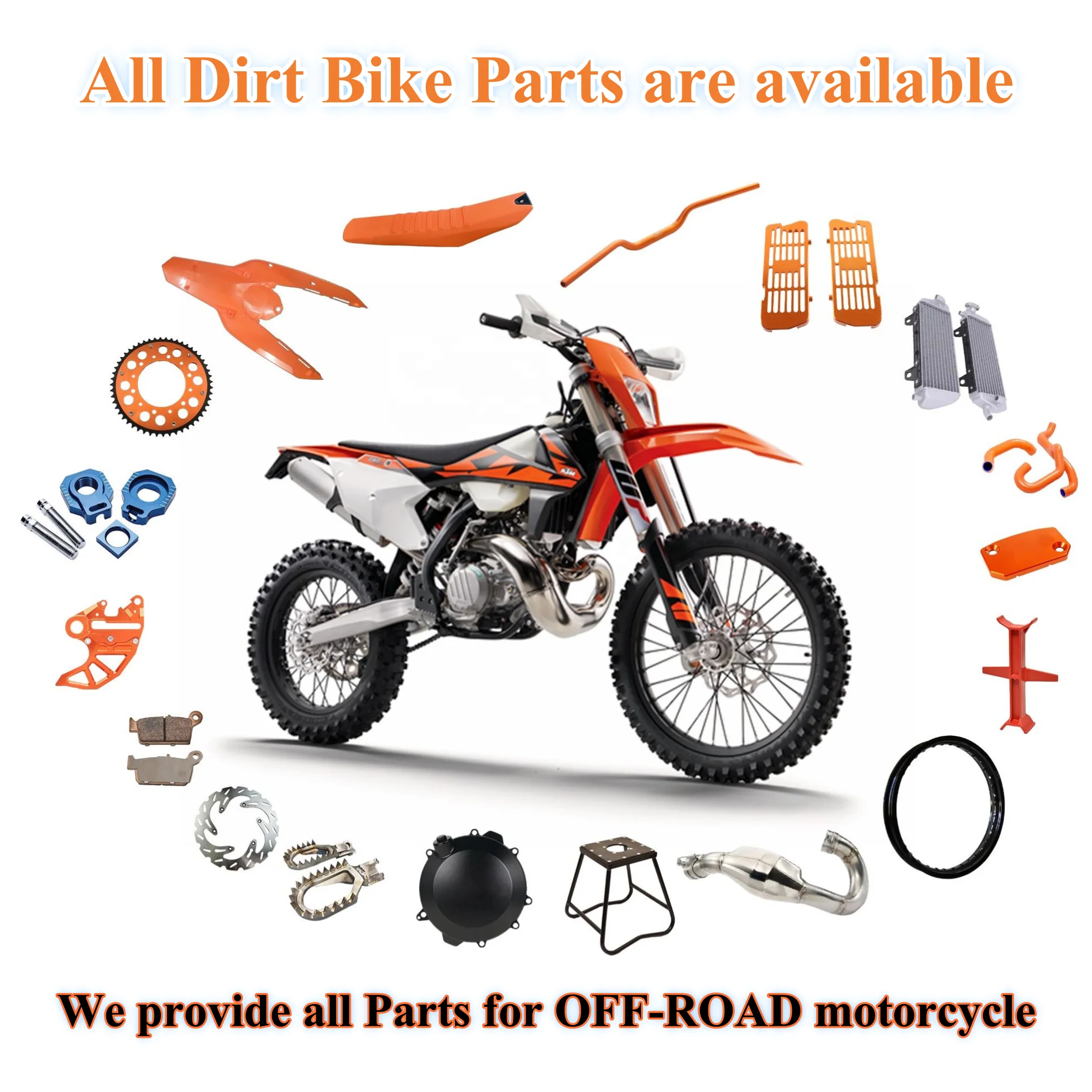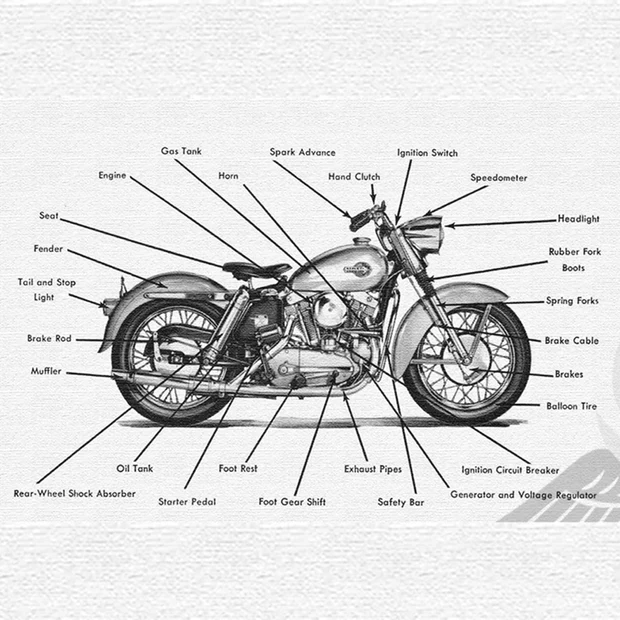What Every Rider Should Know About Choosing Quality Motorcycle Parts Auckland
What Every Rider Should Know About Choosing Quality Motorcycle Parts Auckland
Blog Article
Discover the Necessary MotorBike Components You Need for Optimal Efficiency
Recognizing the vital components of a bike is fundamental for achieving peak performance. Each component, from the engine to the braking system, plays a critical function in total performance and safety and security. Regular maintenance can stop unanticipated failures and improve the riding experience. Several bikers neglect the ins and outs of these systems. Uncovering just how they work together can result in a much more effective adventure. What crucial components should every rider prioritize?
The Engine: The Heart of Your Motorbike
The engine works as the core component of a motorbike, driving its performance and defining its capabilities. It is in charge of transforming gas right into power, which powers the bike onward. Numerous kinds of engines are employed, consisting of single-cylinder, V-twin, and inline arrangements, each offering distinctive attributes fit for different riding objectives and styles. The engine size, usually gauged in cubic centimeters (cc), substantially affects efficiency, with larger engines typically offering more power and torque.Furthermore, the engine's layout and modern technology, such as fuel injection systems or air-cooling versus liquid-cooling, affect effectiveness and dependability. Maintenance is necessary for peak procedure; elements like regular oil changes and monitoring spark plugs guarantee long life. Motorcyclists frequently think about an engine's responsiveness and smoothness, as these qualities improve the general riding experience. Ultimately, the engine continues to be an essential component that specifies not only the bike's efficiency yet likewise the rider's connection to the machine.
The Transmission: Changing Gears Smoothly
The transmission plays a necessary function in a motorcycle's performance, specifically in the technicians of gear changing. Comprehending exactly how to shift gears efficiently can improve the total riding experience, while regular maintenance guarantees peak capability. Proper focus to these facets can substantially affect the durability and effectiveness of the motorbike.

Gear Shifting Mechanics
Smooth gear shifting is important for excellent motorbike efficiency, substantially affecting both velocity and control. The mechanics of equipment shifting involve the communication between the clutch, gear lever, and transmission system. When a motorcyclist engages the clutch, it disengages the engine from the transmission, enabling a gear modification without harming the components. A well-timed launch of the clutch, incorporated with accurate motion of the gear lever, assists in a smooth modification in between gears. This process ensures that the engine runs within its best power band, enhancing performance. Motorcycle Parts Auckland. In addition, understanding the gear ratios and their effect on speed and torque can assist motorcyclists make notified options throughout shifts, ultimately adding to an extra receptive and satisfying riding experience
Maintenance Tips Value
Regular upkeep plays a crucial role in assuring that the transmission system runs efficiently, allowing for smooth gear shifts. On a regular basis altering the transmission and inspecting fluid is important, as old fluid can bring about increased rubbing and wear. In addition, inspecting the clutch for wear guarantees peak engagement and disengagement, avoiding slippage during gear changes. Lubrication of relocating components is similarly crucial to decrease friction and boost efficiency. Motorbike owners should likewise keep track of for leaks and uncommon noises, as these can indicate underlying concerns. By sticking to these upkeep tips, bikers can prolong the life-span of their transmission system, ensuring that gear changes stay seamless and contributing to the general efficiency of their motorbike.
The Braking System: Ensuring Safety on Every Ride
Braking systems are basic elements that straight affect a motorcycle's safety and efficiency. They consist of various parts, consisting of brake pads, rotors, calipers, and hydraulic lines, all functioning with each other to ensure effective deceleration. The sort of stopping system-- normally either disc or drum-- affects responsiveness and quiting power.Regular maintenance is vital to maintain peak efficiency; worn brake pads can cause decreased effectiveness and enhanced quiting distances. Additionally, the high quality of brake liquid ought to be kept track of, as it can take in moisture gradually, endangering braking efficiency.Riders need to also think about the importance of anti-lock braking systems (ABDOMINAL), which protect against wheel lockup throughout sudden stops, enhancing overall safety. Correctly operating brakes are not almost stopping; they impart confidence in the motorcyclist, enabling safer navigation through different surfaces. Inevitably, a reputable stopping system is essential for taking pleasure in every adventure with tranquility of mind.
The Suspension: Enhancing Convenience and Control
A well-functioning shock absorber significantly adds to a motorbike's overall performance, complementing the effectiveness of the stopping system. The suspension plays a considerable function in absorbing shocks from uneven surfaces, guaranteeing a smoother adventure while keeping tire contact with the road. This get in touch with is vital for both stability and control, enabling motorcyclists to navigate edges with self-confidence and precision.Different kinds of shock absorber, such as telescopic forks or mono-shocks, use varying levels of convenience and handling. Effectively tuned suspension improves responsiveness, providing the biker with a more linked feeling to the motorbike. Normal maintenance checks are essential to establish the suspension components, consisting of dampers and springtimes, are working at their ideal. An efficient suspension system not just elevates the riding experience yet likewise adds to the durability of various other motorcycle components by lessening damage. As an outcome, buying quality suspension is essential for any kind of severe motorbike fanatic.
The Tires: Connecting You to the Roadway
Tires play a necessary role in a motorcycle's efficiency, functioning as the primary web link in between the biker and the roadway. Recognizing the different sorts of tires available can significantly impact managing and safety and security. Furthermore, routine upkeep is vital to ensure peak tire performance and long life.
Tire Types Explained
Exactly how do various tire kinds affect a motorbike's efficiency? Tire kinds play a crucial role in establishing a motorbike's handling, stability, and hold. Sport tires, developed for high efficiency, offer improved grip and responsiveness on smooth roadways, making them excellent for racing and aggressive riding. On the other hand, exploring tires prioritize durability and comfort, offering a smoother trip for long-distance travel. Off-road tires, characterized by their sturdy walk patterns, master traction on unpaved surfaces, ideal for journey enthusiasts. Additionally, dual-sport tires blend features from both on-road and off-road categories, catering to versatile riding demands. Ultimately, selecting the right tire type is essential for enhancing performance, guaranteeing safety, and enhancing the overall riding experience.
Maintenance Tips Offered
While riding when traveling, preserving ideal tire problem is essential for safety and efficiency. Frequently checking tire stress is important, as under-inflated tires can bring about bad handling and enhanced wear. It is advisable to examine tread deepness often; worn tires compromise grip and security. Furthermore, riders should look for indicators of damages, such as bulges or splits, which can suggest the requirement for replacement. Revolving tires periodically ensures even use, enhancing longevity. Keeping tires tidy from debris and preventing extreme aesthetics can extend their lifespan. Finally, maintaining proper alignment and equilibrium adds to peak efficiency, lessening tension on various other bike components. Following these upkeep tips will greatly improve the total riding experience.
The Fuel System: Sustaining Performance and Effectiveness
The gas system plays an important function in making the most of a motorcycle's efficiency and performance, as it ensures the optimal shipment of gas to the engine. It consists of several essential elements, consisting of the fuel storage tank, fuel pump, gas filter, and gas injectors or carburetor. from this source Each component must work properly to guarantee a powerful and smooth ride.The gas tank stores gasoline and supplies it to the engine by means of the gas pump, which creates the necessary stress. A fuel filter avoids pollutants from entering the engine, while the injectors or carburetor mix gas with air for combustion.Proper maintenance of the fuel system is vital; a stopped up filter or malfunctioning injector can lead to lowered performance and enhanced gas consumption. By verifying that the gas system operates efficiently, bikers can appreciate enhanced throttle reaction, far better gas economic situation, and on the whole boosted riding experience.
The Electric System: Powering Your Adventure
An effective electrical system is vital for the total performance and safety and security of a motorcycle, as it powers important components such as the ignition, lighting, and different digital systems. This system includes the battery, which shops power, and the generator, in charge of producing power while the engine runs. The wiring harness links these elements, making sure reliable power distribution.Additionally, merges shield the system from overloads, while relays help regulate high-current gadgets with low-power signals. A well-kept electrical system enhances performance by ensuring smooth beginnings and consistent operation of lights and signals, essential for motorcyclist exposure and safety.Regular checks of the battery's charge and connections are essential for avoiding electrical failures. Bikers need to likewise evaluate electrical wiring find more information for damage, making sure all parts work preferably. Eventually, a durable electric system contributes substantially to the total efficiency and reliability of the motorcycle.
Regularly Asked Concerns
How Usually Should I Change My Motorbike's Battery?
The frequency of motorcycle battery replacement depends on use and upkeep (Oem Parts New Zealand). Usually, batteries ought to be changed every three to five years. Regular checks can assist recognize when a replacement is needed for peak performance
What Tools Do I Need for Basic Motorcycle Maintenance?
For standard motorbike upkeep, one calls for important tools such as an outlet set, wrenches, screwdrivers, pliers, tire stress gauge, and a torque wrench. These devices assist in reliable upkeep and guarantee the motorcycle runs successfully and safely.
Exactly How Can I Improve My Bike's The rules of aerodynamics?
To enhance motorcycle the rules of aerodynamics, one must take into consideration adjusting fairings, making use of windshield expansions, optimizing body setting, and lowering overall weight. These modifications help lessen drag, boosting stability and fuel efficiency during trips.
What Are the Indications of a Failing Electrical System?
Indicators of a falling short electrical system include dimming lights, difficulty beginning, irregular tool readings, and blown fuses. Motorbike Components NZ. Uncommon smells or corrosion around battery terminals may likewise suggest underlying issues needing prompt interest for security and efficiency

Just how Do I Choose the Right Oil for My Motorbike?
When picking oil for a motorcycle, one need to take into consideration the producer's requirements, thickness ratings, and the sort of riding. Additionally, standard versus artificial oil can influence efficiency and engine security, influencing the decision greatly. The engine size, commonly determined in cubic centimeters (cc), considerably affects performance, with larger engines typically offering more power and torque.Furthermore, the engine's have a peek at these guys design and innovation, such as gas shot systems or air-cooling versus liquid-cooling, impact efficiency and dependability. A well-functioning suspension system considerably adds to a motorcycle's total performance, enhancing the efficiency of the braking system. The fuel system plays an important role in making best use of a motorcycle's efficiency and efficiency, as it guarantees the optimal distribution of gas to the engine. A fuel filter prevents impurities from entering the engine, while the injectors or carburetor mix fuel with air for combustion.Proper upkeep of the fuel system is vital; a clogged up filter or malfunctioning injector can lead to lowered performance and boosted gas consumption. A well-maintained electrical system enhances efficiency by making certain smooth beginnings and consistent operation of lights and signals, crucial for cyclist visibility and safety.Regular checks of the battery's cost and links are vital for protecting against electric failures.
Report this page